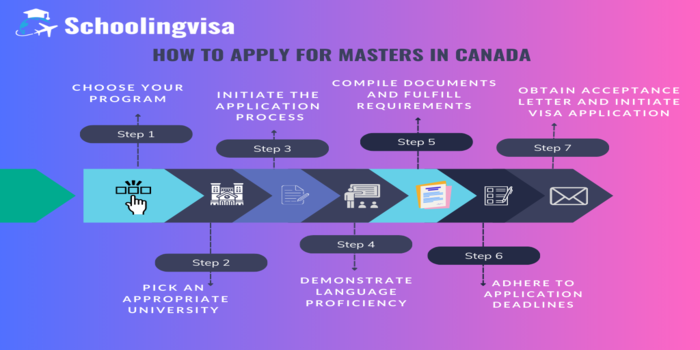Top 9 Universities in Canada for MBA in 2024
Many aspire to pursue their Master’s (MS) in Canada due to its renowned education system, inclusive society, and immigrant-friendly policies. The country has become a global leader in higher education, attracting students from around the world.
A Master’s in Canada typically spans 1-2 years, offering both academic and professional tracks. The program can be course-based, thesis-based, or a combination of both, providing flexibility for diverse academic preferences. The average tuition fees for postgraduate studies in Canada range from 13,362.67 USD to 19,965.83 USD
This guide will provide insights into the top 10 universities in Canada for Master’s programs. It will cover crucial details such as location, fees, and eligibility criteria, assisting prospective students in making informed decisions about their higher education journey in the maple leaf country.
Why Study Masters in Canada?
Canada stands out as a preferred destination for students owing to a myriad of compelling reasons.
The universities in Canada have gained a stellar reputation for their exceptional teaching methods and stringent quality controls. Notably, they are renowned for fostering a research-intensive academic environment. Many institutions actively promote hands-on learning through industry-based projects and internships, providing students with invaluable on-field experience.
Adding to its allure, the cost of education in Canada is notably more budget-friendly compared to several other countries. Additionally, the country offers various scholarship programs to support students in need of financial assistance.
Moreover, Canada’s straightforward and accessible regulations regarding student visas, post-study work permits, and permanent residency make it an ideal choice for those seeking not only an excellent education but also a seamless transition into post-graduate life. This combination of academic excellence, affordability, and student-friendly policies solidifies Canada’s position as one of the premier destinations for studying and living.
Top 10 Universities of Canada to Study Master's (MS) in Canada
Here is a list of Top 10 universities of Canada where you can study for your Masters.
| University | Times Higher Education 2021 | QS World Rank 2021 | Tuition Fee (1st Year) | Location |
University of Toronto | 18 | 25 | 14.61L-36.01L | 27 King’s College Cir, Toronto, ON M5S 1A1, Canada. |
University of British Columbia | 34 | 45 | 5.34L-35.24L | Vancouver, BC V6T 1Z4, Canada |
McGill University | 40 | 31 | 10.51L-15.05L | 845 Sherbrooke St W, Montreal, Quebec H3A 0G4, Canada |
McMaster University | 69 | 144 | 6.67L-27.16L | 4350 S Service Rd, Burlington, ON L7L 4X5, Canada |
University of Montreal | 73 | 118 | 15.12L-16.38L | 2900 Edouard Montpetit Blvd, Montreal, Quebec H3T 1J4, Canada |
University of Alberta | 131 | 119 | 4.99L-14.5L | 116 St & 85 Ave, Edmonton, AB T6G 2R3, Canada |
University of Ottawa | 145 | 279 | 14.91L-17.51L | 75 Laurier Ave. E, Ottawa, ON K1N 6N5, Canada |
University of Calgary | 200 | 246 | 4.73L-15.07L | 2500 University Dr NW, Calgary, AB T2N 1N4, Canada |
University of Waterloo | 201-250 | 166 | 12.74L-27.83L | 200 University Ave W, Waterloo, ON N2L 3G1, Canada |
Western University | 201-250 | 203 | 8.52L-27.4L | 1151 Richmond St, London, ON N6A 3K7, Canada |
Key Research Areas and Top Subjects to Pursue in Canada for MS
Computer Science/IT: The global demand for graduates in Computer Science and IT remains consistently high, and Canada reflects this trend.
Canada’s tech sector boasts a substantial workforce, encompassing about 488,000 IT professionals involved in diverse roles such as analysts, management, software development, and information security.
The average annual salary within the Canadian IT industry falls within the range of $76,000 to $81,500, underlining the competitive compensation offered in this field.
Engineering/Engineering Management: Industries centered around core engineering and technology have historically been driven by a demand for skilled professionals. Mechanical, civil, electrical engineering (EE), chemical engineering, and engineering management emerge as the most sought-after fields in this domain.
Engineering graduates in Canada typically command an average annual salary of approximately $81,700, showcasing the competitive remuneration associated with these in-demand engineering disciplines.
Medicine and Healthcare: The fields of medicine, bioscience, and healthcare consistently remain in high demand as long as life exists on our planet. In 2019, Canada had a robust healthcare sector with approximately 644,000 professionals, including physicians, dentists, nurses, and midwives, highlighting the enduring need for skilled professionals in these critical areas.
Psychology and Human Resources: Companies consistently express a strong desire to onboard talented and skilled professionals, but the recruitment and remuneration of such individuals may pose challenges.
In response, organizations actively invest in enhancing the skills and training of their current workforce. This strategy significantly increases the demand for HR professionals, industrial psychologists, and career advisors on a global scale.
Agricultural Science and Forestry:Agricultural Science emerges as a potential solution to the growing challenges posed by climate change, global warming, and food security. This makes countries such as India and Canada particularly promising for job opportunities in fields like agricultural science, agronomy, and forest consultancy. The demand for professionals in these areas is expected to be robust, given the pressing need for solutions to address environmental and food-related concerns.
Top Scholarship Schemes in Canada
Here is a list of several scholarships available for consideration while pursuing your Master’s in Canada:
Government-Sponsored Scholarships: Explore a range of scholarships provided by the Canadian government to assist international students pursuing their master’s degrees. These may include awards based on academic merit or specialization.
University-Specific Scholarships: Many Canadian universities offer their own scholarships to support exceptional master’s students. These awards may be granted for outstanding academic performance, research potential, or community involvement.
Industry-Backed Scholarships: Investigate scholarships supported by various sectors and industries in Canada to attract and sustain talented individuals pursuing advanced degrees. Look for opportunities aligned with your field of study.
Research Grants and Fellowships: Look into research grants and fellowships available for master’s students engaged in innovative research. These opportunities often come with financial support and provide valuable research experience.
Scholarships from Professional Associations: Explore scholarships provided by professional associations and organizations relevant to your area of study. These entities often encourage academic excellence and advancements in specific industries.
Diversity and Inclusion Scholarships: Consider scholarships specifically designed to promote diversity and inclusivity in higher education. Explore opportunities dedicated to supporting individuals from underrepresented backgrounds.
International Student Scholarships: Check for scholarships tailored for international students pursuing their master’s degrees in Canada. These scholarships may cover tuition fees and living expenses.
Community and Non-profit Organization Scholarships: Investigate scholarships offered by community groups and non-profit organizations. These scholarships may emphasize community involvement, leadership, or contributions to social causes.
Merit-Based Scholarships: Many scholarships are awarded based on academic achievement. Ensure you meet the eligibility criteria and consider applying for those recognizing exceptional academic performance.
Government and Non-Government Grants: In addition to scholarships, explore grants provided by both governmental and non-governmental entities to support master’s students in various academic disciplines.
These scholarship opportunities can significantly alleviate the financial challenges associated with pursuing a Master’s in Canada, providing crucial support for your academic endeavors.
Process of Application
Follow these steps to apply for MS in Canada:

Step 1: Choose Your Program
Begin by selecting the most suitable course based on your qualifications, aligning with your interests and field of study.
Step 2: Pick an Appropriate University
Conduct thorough research or seek guidance from an immigration expert to choose a university that aligns with your course of interest.
Step 3: Initiate the Application Process
Access the university’s online application form, diligently fill in all required details, pay the application fee, and verify the documents necessary for submission.
Step 4: Demonstrate Language Proficiency
To meet the eligibility criteria for Canadian universities, it is essential to showcase proficiency in English. Take an IELTS or TOEFL test to satisfy the CLB (Canada Language Benchmark) requirements, with a minimum IELTS score of 6.5.
Step 5: Compile Documents and Fulfill Requirements
Consult your immigration case officer for a comprehensive list of original documents and copies needed. Craft a compelling Statement of Purpose (SOP) addressed to the Dean of Admissions at your chosen university. Complete mandatory processes for criminal clearance and biometrics.
Step 6: Adhere to Application Deadlines
Submit your fully completed and attested application within the specified deadline to avoid the risk of rejection.
Step 7: Obtain Acceptance Letter and Initiate Visa Application
Secure an Offer Letter from the university, a prerequisite for applying for the SDS (Student Direct Stream) Visa application. This document is crucial for advancing in the visa application process.
Jobs After Master's in Canada
Individuals graduating from Canada’s top universities enjoy the privilege of obtaining a 3-year work permit, paving the way for permanent residency. Given Canada’s historical emphasis on attracting highly skilled immigrants, an impressive 70% of international candidates in the country hold a master’s degree.
The potential for securing employment in Canada following the completion of an MS major is contingent upon the specific program undertaken.
- In the Canadian job market, professionals with a background in Computer Science command some of the highest salaries.
- The healthcare, bioscience, and medical sectors, ranking as the third-largest industries, offer abundant employment opportunities for those with a master’s degree.
- Statistical data underscores that individuals with a Master’s degree typically earn 29% more than their counterparts holding a bachelor’s degree.
- Employees in Canada experience a salary increment of approximately 9% every 15 months, highlighting the ongoing professional and financial growth available to those with advanced degrees.
Frequently Asked Question
The eligibility criteria for each institution vary based on the chosen stream and course of study. However, some commonly shared requirements include:
- Minimum 16 years of education with at least a 3.0 GPA in Bachelors is required. Some universities accept a three-year bachelor’s course and 15 years of education.
- At least an overall score of 6.5 in IELTS.
- A GRE score of 260 minimum is required.
|
Job |
Average Salary |
| Primary Production Managers | C$69,653 |
| Doctors and Dentists | C$142,000 |
| HR Recruiters | C$44,000 to C$52,000. |
| Nurses | C$58,831.50 |
| Information Security Analysis | C$68,411 |
| Marketing Analysis | C$60,000 |
| Engineers | C$60,200 to C$90,000 |
| Financial Analysts | C$56,128 |
| Education | C$55,477 |
| Accountants | C$56,000 |
| Office managers and administrative assistants | C$35,000 to $46,000 |


